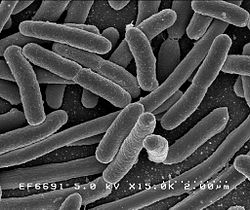 Does it matter what blood type (A, O, B, AB) we have when dealing with microbes that can make us sick? Apparently it does for certain illnesses.
Does it matter what blood type (A, O, B, AB) we have when dealing with microbes that can make us sick? Apparently it does for certain illnesses.
New research suggests that people with blood type O and B can handle a strain of Escherichia coli referred to as "enterotoxigenic E. coli" better than those with blood type A. This bacteria is associated with traveler's diarrhea and diarrhea in developing countries, with especially severe effects among young children. It turns out that those with blood type A get sicker (more severe diarrhea) and sooner, than those with blood type O and B. Antibiotics successfully treats the diarrhea.
By the way, other research also finds a link with certain diseases and blood types (e.g. diabetes, malaria, and cholera). From Medical Xpress:
Blood type affects severity of diarrhea caused by E. coli
A new study shows that a kind of E. coli most associated with "travelers' diarrhea" and children in underdeveloped areas of the world causes more severe disease in people with blood type A.
The bacteria release a protein that latches onto intestinal cells in people with blood type A, but not blood type O or B, according to a study led by researchers at Washington University School of Medicine in St. Louis. A vaccine targeting that protein could potentially protect people with type A blood against the deadliest effects of enterotoxigenic E. coli (Escherichia coli) infection.
The study is published May 17 in The Journal of Clinical Investigation. The work was conducted in collaboration with investigators at Johns Hopkins University, the National Institutes of Health (NIH), and the Naval Medical Research Center.
Enterotoxigenic E. coli are responsible for millions of cases of diarrhea and hundreds of thousands of deaths every year, mainly of young children. It primarily infects people living in or visiting developing countries. Some people infected with the bacterium develop severe, cholera-like, watery diarrhea that can be lethal. Others experience unpleasant symptoms but recover easily, while some don't get sick at all.
Years ago, doctors noted that children naturally infected with enterotoxigenic E. coli in Bangladesh seemed to get sicker if they had blood type A, but the reason for this was never tested. Fleckenstein, instructor in medicine Matthew Kuhlmann, MD, postdoctoral researcher Pardeep Kumar, Ph.D., and colleagues investigated whether blood type influences disease severity by looking at what happened to people of different blood types who drank a cup of water laced with E. coli.
In controlled human infection clinical trials, researchers at Johns Hopkins University gave healthy volunteers a dose of an E. coli strain originally isolated from a person in Bangladesh with severe, cholera-like diarrhea. Then, they observed the volunteers for five days. Those who developed moderate to severe diarrhea were treated with antibiotics. The disease comes on quickly, so anyone who was still healthy at the end of five days was unlikely to get sick later. Nonetheless, any remaining healthy participants also were given antibiotics to clear the bacteria before going home.
Kuhlmann and colleagues obtained data and blood samples from 106 people, each of whom participated in one of four such studies. They found that people with blood type A got sick sooner and more seriously than those of other blood types. More than eight out of 10 (81 percent) of blood group A people developed diarrhea that required treatment, as compared with about half of people with blood group B or O.
Blood groups are based on the sugars that decorate the surface of red blood cells and other cells. People with group A blood have sugars that are distinct from those present in either B or O blood groups. People with blood group AB carry both A- and B-type sugars on their cells.
The researchers found that the bacteria produce a specific protein that sticks to A-type sugars—but not B- or O-type sugars—on intestinal cells. Since the protein also sticks to E. coli, it effectively fastens the bacteria to the intestinal wall, making it easy for them to deliver diarrhea-causing toxins to intestinal cells.
Basic hygiene—washing hands and purifying water—is the best protection against diarrheal diseases because it works against all kinds of organisms. But the people who suffer most from diarrhea are small children. For them, and others who don't have reliable access to basic sanitation or clean water, a vaccine could be lifesaving. There are many strains of enterotoxigenic E. coli, and developing a vaccine that protects against all of them has been a challenge because no single protein is found in all strains.
 Escherichia coli Credit: Wikipedia
Escherichia coli Credit: Wikipedia
